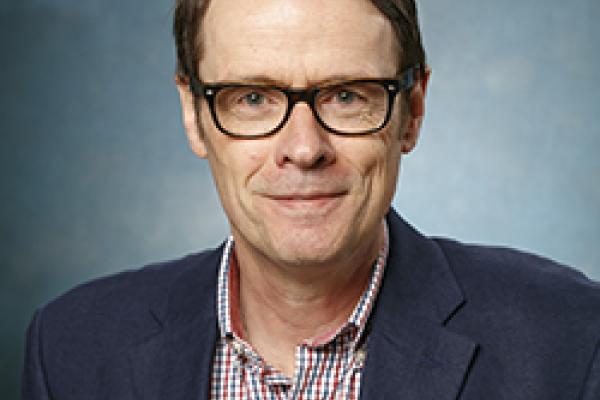Q&A faculty spotlight: Greg Anderson

Greg William Anderson is an exceptional scholar focused on ancient Greece, historical thought and critical theory, but it’s his skills in the classroom that keep earning accolades. Anderson has previously accepted seven teaching awards, and in 2018, he received the Alumni Award for Distinguished Teaching. Anderson’s exceptionally high teaching scores average 4.93/5.0, including for large lecture classes where it is typically harder to achieve high scores. Students are effusive in their comments about him, often noting, “He always has humor in his lessons to keep us entertained.”
Anderson’s colleagues point to his versatility in the classroom as one of his strengths. “His courses satisfy both the casually interested undergraduate, who may take only this one class in Greek history in her life, and the graduate student who is committed to a professional future as a specialist in the same field,” writes a colleague.
Education
BA, Classics, University of Newcastle (UK)
MA, Classics, University of London (UK)
PhD, Classics, Yale University
Describe your current research.
My research interests are ancient Greek history, the theory and practice of history as a discipline, and modern critical theory. I am particularly interested in the question of how we can write true or real histories about pre-modern and non-western peoples, peoples whose ideas about what is true or real in experience were very different from our own. In my recent book The Realness of Things Past (2018), I argue that the peoples we study, not modern historians, should be the ultimate judges of what was true and real in their particular worlds of experience.
What undergraduate classes are you currently teaching?
Since I am currently the Chair of Graduate Studies in History and have a course release, I am only teaching one class: History 3210: Archaic Greece. My surveys of ancient Greek history aim not only to give students a richer, more detailed sense of the distinctive world of the ancient Greeks, but also to encourage them to think critically about our own modern world, by seeing it, as it were, through the eyes of the Greeks.
What aspects of your teaching give you the most satisfaction?
1) Introducing students to fascinating historical worlds that they have not previously studied in detail
2) Encouraging students to think critically about the past and the present
3) Getting to know individual students and their thoughts and interests
What book/movie would you recommend or what music do you enjoy?
Books -
1) Non-fiction: Meeting the Universe Halfway (2007) by Karen Barad (theoretical physicist/feminist theorist at UC Santa Cruz) will forever alter the way you think about what is real in experience
2) Fiction: Anything by Penelope Lively, a very thoughtful but rather under-rated British novelist, who loves to explore the role played by memory in the lives of her characters
Recent movies – all witty, moving, and thought-provoking
Sorry to Bother You (2018)
Mr. Turner (2014)
The Fantastic Mr. Fox (2009)
Music -
Classic jazz: especially Duke Ellington, Miles Davis, Paul Desmond, Cannonball Adderley, Chico Hamilton, and Bill Evans
Jazz Rock/Progressive Rock: especially Frank Zappa, Gentle Giant, and bands from UK’s “Canterbury Scene” (e.g., Hatfield and the North, National Health, and Soft Machine)
20th Century French classical music: e.g., Claude Debussy, Maurice Ravel, Francis Poulenc, and Jean Francaix
What is an interesting place you’ve visited or has inspired you?
I lived and taught English Language in Japan for 1.5 years in the late 1980s before moving from U.K. to U.S. for Ph.D. study. Though this experience had nothing directly to do with ancient Greece, it has had a deeper impact on my life and work than any other single experience. Above all, living in a culture that was very different from my own encouraged me to question almost everything that I thought was “normal” or “natural” in life, an excellent “training” for a historian. I strongly encourage all students to consider having similarly mind-opening experiences before they “settle down” into a career.
Would you like to share an interesting fact about yourself?
I played cricket and (field) hockey at the inter-collegiate level back home in England.
I currently play electric bass in a classic rock band (Led Zeppelin, The Who, Cream, Hendrix, etc.).
Feel free to stop by my office hours.
I love to talk about sports, music, and anything to do with history.
Learn more about Professor Anderson's work, email and office location on his department page.
